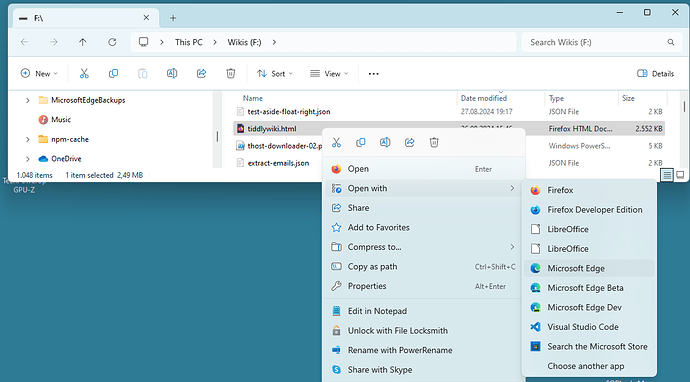I just thought I would share this experiment in case someone has a reason or interest in this.
On Windows it is possible to add file associations to .tw files that open in the default browser and despite not having the html extension they are identified as working html files/wikis. As local files they also work out of the box with the Timimi saver.
I also just experimented with and created additional extensions as follows;
- .twc open in Chrome
- .twf open in FireFox
- .twe open in Edge
- .two open in Opera
It is possible to install each just by opening a .reg file to put the required entries into the registry.
- a r-click “open with” also allows you to open the wiki in any nominated browser.
This makes it possible to ensure, by default, a particular wiki opens in a particular browser. especially if you open your wikis from the file manager.
- I for one do keep wikis in specific browsers for different work environments and opening the same wiki in a different browser is unwise as it lets changes in one save over the other.
- Perhaps with a little work we could also open wikis in TiddlyDesktop @jeremyruston ?
This also allows such wikis to be sent as attachments in some email clients without them being dumped as a risk.
This allows tiddlywikis to be treated more like documents, opened by the specific browser as if it were the application like .docx opens word.
- One advantage being you can more readily use the operating system search for tiddlywikis without having to see all html files, or backups if they exist, because you can limit the search to .tw* files.
Given we have access to the filename and extension within tiddlywiki it would be possible to include TiddlyWiki script in a wiki to detect if it has being opened in the implied browser and warn the user to open it in the indicated browser.
- Ideally if there were a way to open such files from a browser url (with custom filename) in an external and appropriate browser, given the extension, it would be great. I believe this is possible but still not sure how to do this.

